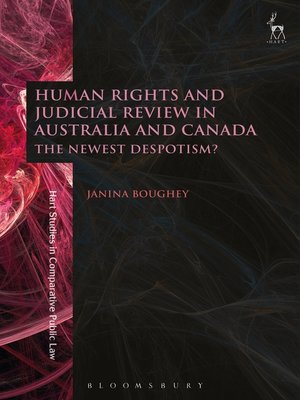Human Rights and Judicial Review in Australia and Canada
ebook ∣ The Newest Despotism? · Hart Studies in Comparative Public Law
By Janina Boughey

Sign up to save your library
With an OverDrive account, you can save your favorite libraries for at-a-glance information about availability. Find out more about OverDrive accounts.
Find this title in Libby, the library reading app by OverDrive.



Search for a digital library with this title
Title found at these libraries:
| Library Name | Distance |
|---|---|
| Loading... |
It is commonly asserted that bills of rights have had a 'righting' effect on the principles of judicial review of administrative action and have been a key driver of the modern expansion in judicial oversight of the executive arm of government. A number of commentators have pointed to Australian administrative law as evidence for this 'righting' hypothesis. They have suggested that the fact that Australia is an outlier among common law jurisdictions in having neither a statutory nor a constitutional framework to expressly protect human rights explains why Australia alone continues to take an apparently 'formalist', 'legalist' and 'conservative' approach to administrative law. Other commentators and judges, including a number in Canada, have argued the opposite: that bills of rights have the effect of stifling the development of the common law. However, for the most part, all these claims remain just that – there has been limited detailed analysis of the issue, and no detailed comparative analysis of the veracity of the claims. This book analyses in detail the interaction between administrative and human rights law in Australia and Canada, arguing that both jurisdictions have reached remarkably similar positions regarding the balance between judicial and executive power, and between broader fundamental principles including the rule of law, parliamentary sovereignty and the separation of powers. It will provide valuable reading for all those researching judicial review and human rights.







